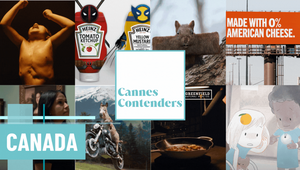
Creativity Squared: Why 'Stupid' is Marty Hoefkes and Michael Morelli's North Star

Marty Hoefkes and Michael Morelli are the creative team at Broken Heart Love Affair.
Globally recognised for their work with the Canadian Down Syndrome Society, TD Bank and Ikea, Marty and Mike have previously worked at FCB where they also led creative for Air Canada, OLG, Lotto Max, BMO, and Hershey Twizzlers. The duo has been awarded at Cannes, the One Show, D&AD, Clios, and many other local and international shows.
Person
What kind of creative person are you?
Marty> Mike and I are basically children. When we sit down to chat through ideas, there’s a lot of 'What if' and 'Imagine there was' and 'Wouldn’t it be weird if' kind of conversation. We’ll write down every idea or thought on paper, no matter how stupid.
Mike> Especially the stupid ones.
Marty> Yeah, 'stupid' is our north star. If it makes you laugh then there’s usually some nugget in there worth exploring.
Mike> It’s not until we’re a day or two out from sharing work that we start whittling ideas down to what’s on brief and won’t make our account teams embarrassed in the presentation.

Do you think creativity is something that’s innate or something that you learn – why?
Mike> It’s hard not to be creative. Everyone’s got their own thing, whether that’s singing in their car or barbecuing or mowing patterns in their lawn.
Marty> When it comes to ads specifically, I’d say there are two parts to it - there’s generating good ideas, and then there’s understanding what makes an idea good - and they’re both learnable skills to a certain extent.
Generating ideas is that muscle everyone talks about that gets better when you use it more. I find that when someone says they can’t write a headline, it’s usually because they’ve written four and aren’t happy with them. You have to write dozens to get to a workable one, and hundreds to get to a great one. Quantity begets quality.
Then to understand what makes ideas good, you have to at least loosely study what’s out there, you have to talk to other people and get their perspectives, and you have to look far outside of advertising, too. “I wish I made that” is always going to be a gut feeling, but if you feed your gut enough good work then eventually it’ll start wishing for the right stuff.
Mike> You want your understanding muscle to be just a little stronger than the generating muscle. If it’s too strong then you’ll be frustrated that you’re not having good ideas, and if it’s not strong enough then you’ll think all your ideas are equally incredible and that juries of the world’s top creatives just don’t understand your genius.
Product
How do you assess whether an idea or a piece of work is truly creative? What are your criteria?
Marty> It really depends on the kind of work. If it’s aiming to be funny or clever, then it’s gotta be like a good joke, where the punchline is as surprising as possible but makes perfect sense in hindsight.
Mike> Or it could just be really fucking weird.
Marty> For serious work, then I think having an insightful and well-articulated problem is just as important as having a smart and simple solution. Instead of a joke structure, it’s more like a story arc. The climax is more satisfying if you widen that divide between the protagonist’s lowest point and their big, triumphant victory.
Mike> Or, again, it could just be really fucking weird.
Marty> Also, hot tip for young creatives: selling a good idea is like 90% about having a clever title. Even if it’s not consumer facing, a clever title will help an idea breeze past your creative directors and clients.
Mike> Please don’t include that, it’s our secret technique.
Marty> Too bad. I’m sending our answers, so I get to decide.

Has that criteria shifted or evolved over the years?
Mike> The way we think about ideas has definitely shifted over the years. It also shifts based on the day, or whether we’ve had lunch yet.
Marty> It’s why we try not to be too hasty to kill ideas when creatives share their work with us, and make sure they’ve got an opportunity to discuss which they’re most passionate about. If someone is excited about an idea, it’s worth seeing where they take it.
Mike> We don’t just murder ideas in front of people unless it’s really bad.

Overall, what do you make of the industry’s creative output right now? What’s exciting you about it or frustrating you?
Marty> The industry has gotten a little too good at case studies. I feel like Columbo when I’m watching them, trying to detect if the idea is actually good and really happened or if they just spent seven months and $180k crafting the case study.
Process
How do you like to start a campaign or creative project?
Mike> We’ve learned to ask a lot of questions about the brief, trying to simplify it and hammer down the ask to four or five big, bold words that can take root in the back of our minds. Then we’ll just dive in.
Marty> The process is usually Day One: great ideas. Day Two: oh shit those were actually awful ideas, are we bad at this? And then after a few days of ups and downs we start getting to the good bits and keep working from there.
Are there any tools or platforms (analogue or digital) that you find particularly helpful for gathering or iterating ideas?
Mike> We’re not too structured in how we operate. We really just wing it.
Marty> Eventually we’ll check out reference sites and scour reels from directors we like. I’ve certainly googled 'idioms about firetrucks' or whatever. And we’re really into AI stuff now, like ChatGPT and Midjourney and Adobe generative fill. Okay, maybe we use a lot of tools.
Mike> But the point is we’re not structured in how we use them.

When it comes to the hard bits of a project, when you’re stumped, do you have a process or something you like to do for getting past those tricky bits?
Marty> Time solves all briefs. Just gotta keep pushing even if you’re not feeling like you’re getting anywhere. But if you can’t get more time, then last minute panic works, too.
Press
How did you hone your craft?
Mike> We’ve been lucky to get to work around so many amazing creative people that were willing to show us what it takes to go from a good idea to an amazing finished product. We’ve also worked around a small number of people who showed us how to make work that sucks. But that’s helped us hone our craft, too.
Marty> There are lessons in every project, and you want to learn equally from your successes and your mistakes.

What advice would you give to clients looking to get the best out of the teams and agencies they worked with?
Marty> This one’s for everyone, not just clients: enthusiastic people produce better work faster and cheaper. But enthusiasm is a finite resource. You can’t throw money at it. It will evaporate if you get too finicky with feedback or start everyone spinning with unnecessary revisions. Try not to push back when you can push forward, you know?
Mike> It’s a surprisingly short distance between someone being excited to pour every ounce of their creativity into the work, and them phoning it in. But if yours is always the project that your teams are most excited about, then the finished product will be better every time.
Marty> Of course, Mike and I are unwavering in our excitement and enthusiasm for every project. We’re talking about everyone else.















